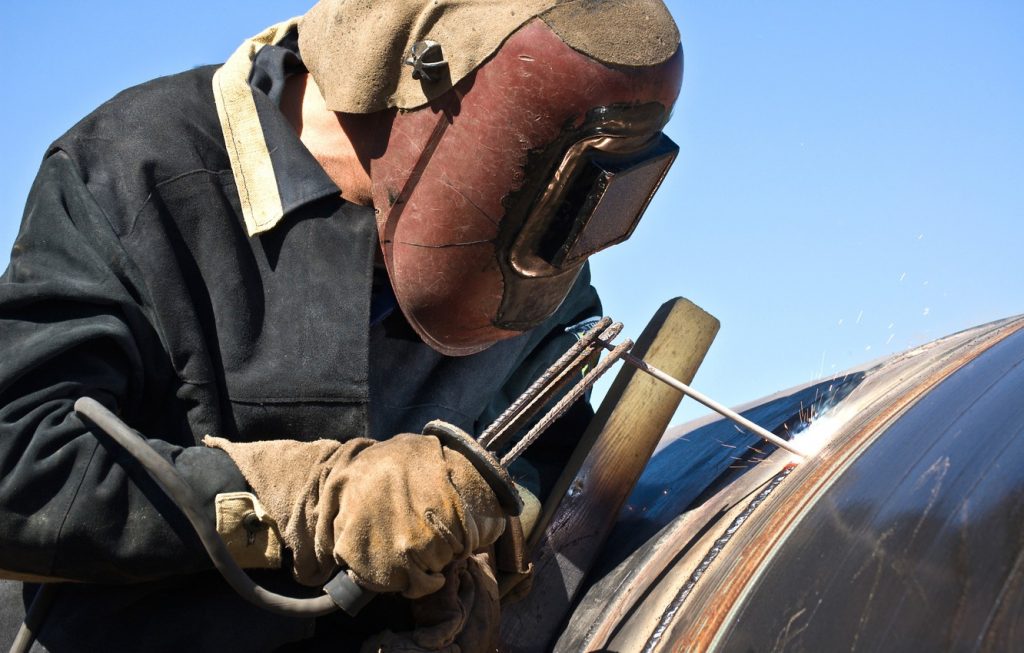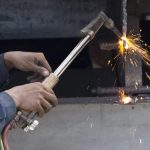There are several factors that determine the list of items you need for your welding protective gear. Some of those factors are the type of job, the power available, the size of the shop, etc. Nevertheless, for most jobs the industrial safety supplies include similar items and their purpose is more or less the same: protect the workers from dangers, such as breathing in harmful substances, injuries, and even possible life-threatening situations. In essence, safety work gear is there to protect your body, and it’s an integral part of the welding equipment.

When it comes to welding, there are several hazards of which you need to be aware. The most common injuries amongst welders are burns from hot metals or from the weld spatter. Welders can also suffer injuries due to electric shock or arc rays. To minimise all of these potential risks, there’s specialised welder’s personal protective equipment that typically includes protection for your eyes and your face, ear protection, protective clothing to guard your body against burns, like long sleeve jacket and long pants, welding sleeves, gloves, high boots. It may also include an apron, a cape, a respirator, etc.
Face, Eyes and Ear Protection
During a welding job, the worker should constantly protect their face and their eyes from harmful radiation. So, it goes without saying that the first thing you need to think about is finding the right welder’s safety equipment exactly for these parts of your body. In the welding industry you can get many different types of personal protective equipment for your face and eyes, depending on your preferences, your needs and, of course, your budget. Welding helmets, hand shield, welding goggles, safety glasses. They protect against radiation, irritation and chemical burns, flying particles and debris, sparks and intense light.

While working, you should also be wearing ear protection at all times. Earplugs can protect you from loud noise, which can not only cause ringing in years, but it can in time affect your hearing. However, while you should be wearing earplugs at all times, they are not going to protect your ears from sparks or splatter. For this, you’ll need ear muffs. You could also wear a headset to protect your hearing, and it can even come with AM/FM radio functionality. Furthermore, you could also get additional neck, throat and ears protection from spatter, attachable to your helmet for instance.
Lungs Protection
When you are working you can breathe in a number of harmful fumes and gases, which can lead to serious health issues, such as metallic oxides, fluorides, silicates, paint, solvents, rust inhibitors and many other dangers. This is why it’s vital for the facility where you work to be ventilated, but even more importantly why you should get protective gear for your lungs. There are different industrial safety supplies when it comes to lung protection, including face masks with filters against odours, different types of welding air-purifying respirators etc. For more convenience and protection, you can also get a welding helmet that features a respirator.
Protective Workwear
To protect your body from burns and radiation you’ll need to get several pieces of industrial workwear and safety gear. This will include several clothing items, as well as gloves, safety shoes and other accessories. Your protective clothes should always be dry while you are working because wet clothes increase the possibility of an electric shock.
For your upper body, you’ll need to get a safety jacket and shirts. Welding jackets are designed to be temperature resistant, to protect your body from heat and burns. They are typically made from cotton and leather. For instance, shirts often have cotton body for comfort, and leather sleeves for protection.

Furthermore, like your face and eyes, while you are welding your arms and hands are exposed to a lot of dangers, including heat, sparks, debris, etc. Fortunately, safety equipment suppliers produce very convenient personal protective gear for your upper extremities. Designed to protect your arms, welding sleeves can prevent sparks, spatter and hot debris to come in contact with your skin. Along with gloves and the welding jacket, they protect your hand and arm skin from heat, burns and fires. Gloves also protect you from electric shock.
For extra protection, you can get an apron and a cape. Capes can offer additional protection for your shoulders and your arms, while welding aprons cover the area from the chest to the knee. You should also protect your legs and your feet against the same hazards: heat, sparks, burns, radiation etc. For this, you need protective leggings or pants, made of denim, cotton or leather. You should also protect your feet with temperature resistant safety boots with rubber soles and ideally with lace covers. For extra protection you can get leather shields that you can slip on or over your shoes, to stop sparks and spatter.





Comments are closed.